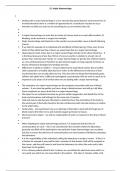Lecture notes
major haemorrhage
- Module
- Clinical sciences
- Institution
- Aston University, Birmingham (Aston)
preview:• A major haemorrhage can arise due to variety of reasons such as a road traffic accident, GI bleeding, aortic aneurism or surgery for example. • Major haemorrhage and blood loss is the number one preventable cause of death following trauma. • If we take the example of an individual...
[Show more]



